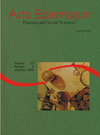<b>O que é um parasito? Uma análise etimológica e semântica do termo parasito em diferentes idiomas</b> - DOI: 10.4025/actascihumansoc.v29i2.824
Resumen
Aliando a semântica à pesquisa etnobiológica, este estudo realizou uma análise etimológica e semântica do termo parasito e seus derivados, descrevendo seus significados em dicionários de seis idiomas. Foram consultados 38 dicionários, catalogados no acervo da Biblioteca Central da Universidade de Brasília e do Goethe-Zentrum Brasília. Etimologicamente, parasito vem do grego παράσιτος, parásîtos (de pará, ao lado, junto de + sîtos, alimento), podendo significar “aquele que come ao lado de outro”. A análise do lexema parasito, nos dicionários consultados, revela grande variedade de significados, incluindo os biológicos e conotativos (social, religioso e físico), alguns peculiares a cada idioma. Foram registrados 35 sinônimos, a maioria no idioma português. Os significados biológicos do lexema parasito foram os mais predominantes nos dicionários analisados nos diferentes idiomas, sendo as definições mais completas observadas nos dicionários de francês e inglês. Dentre os significados conotativos, o social foi o mais freqüente, referindo-se tanto ao comportamento alimentar humano de comer na casa alheia quanto à dependência financeira. Percebe-se também que os dicionários francófonos, alemães, italianos e ingleses apresentam maior variedade de significados que os portugueses e os espanhóis, o que deve refletir diferenças culturais e de percepção dos parasitos. Este estudo indica que os significados biológicos do lexema parasito devem ser revisados nas futuras edições da maioria dos dicionários consultados.Descargas
DECLARAÇÃO DE ORIGINALIDADE E DIREITOS AUTORAIS
Declaro que o presente artigo é original, não tendo sido submetido à publicação em qualquer outro periódico nacional ou internacional, quer seja em parte ou em sua totalidade.
Os direitos autorais pertencem exclusivamente aos autores. Os direitos de licenciamento utilizados pelo periódico é a licença Creative Commons Attribution 4.0 (CC BY 4.0): são permitidos o acompartilhamento (cópia e distribuição do material em qualqer meio ou formato) e adaptação (remix, transformação e criação de material a partir do conteúdo assim licenciado para quaisquer fins, inclusive comerciais.
Recomenda-se a leitura desse link para maiores informações sobre o tema: fornecimento de créditos e referências de forma correta, entre outros detalhes cruciais para uso adequado do material licenciado.


























